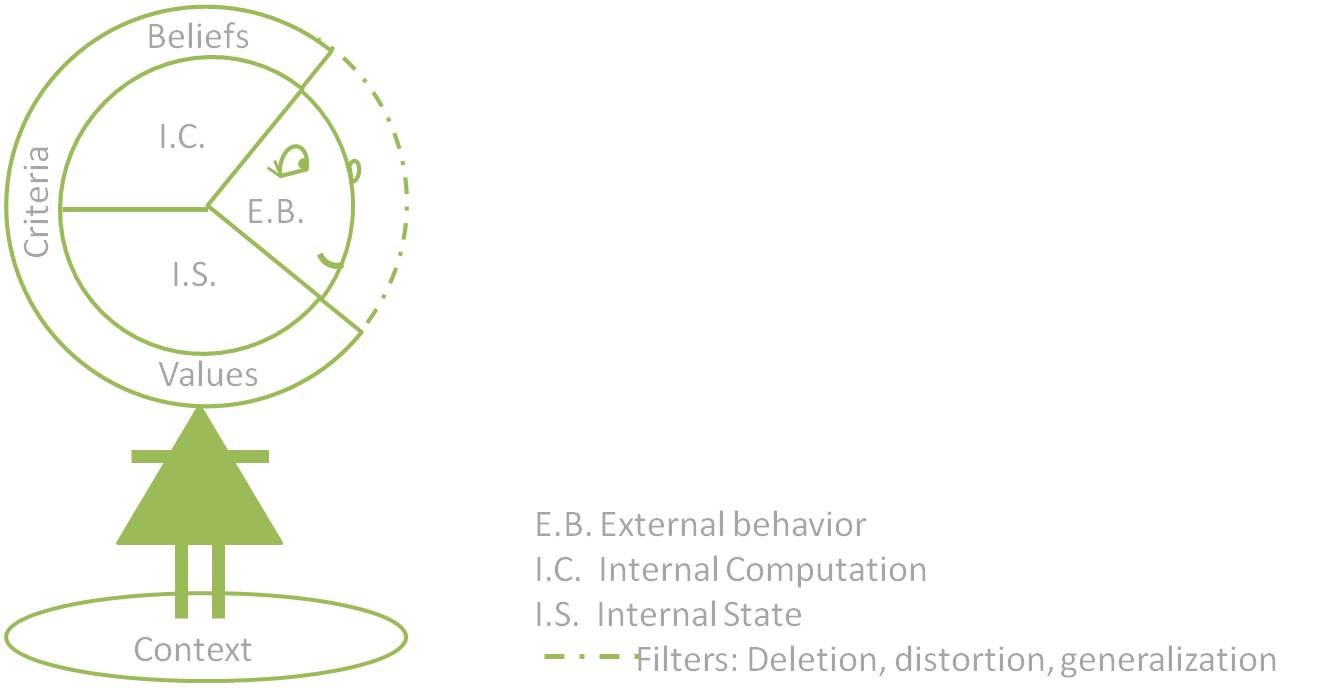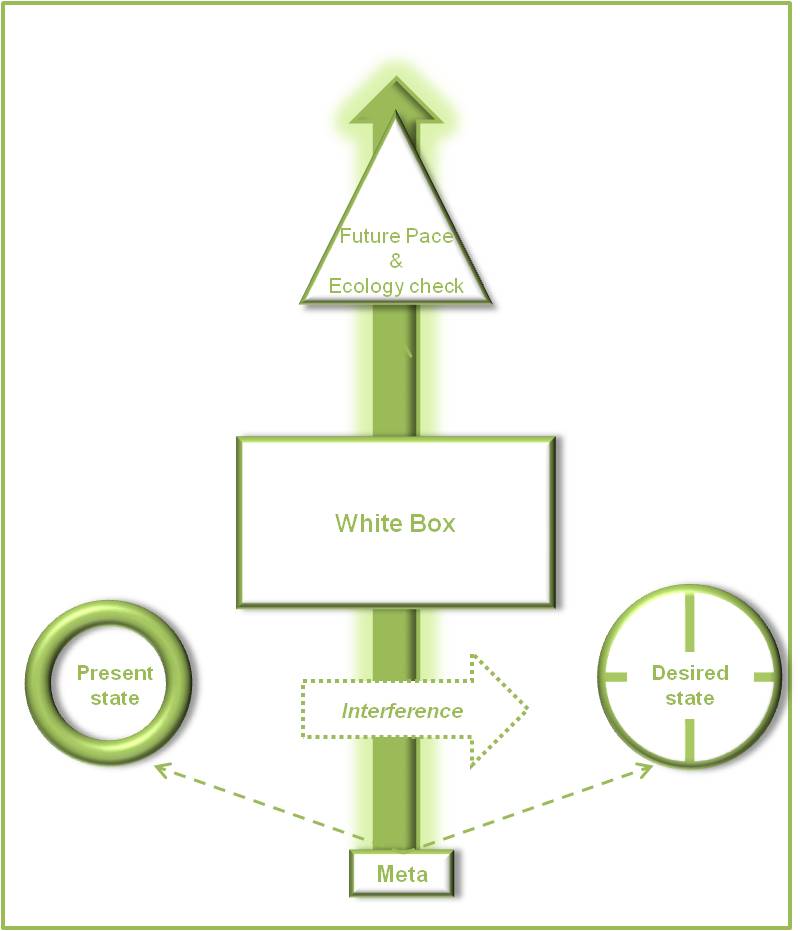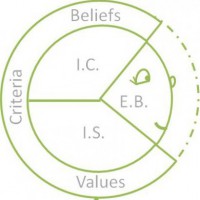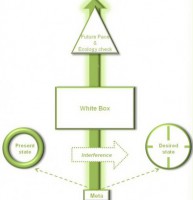Koru coaching's methodology is based on NLP, which is practical and goal oriented. In this section you can read about the following subjects;
- Definition of NLP
- Presuppositions of NLP
- Structure of the Subjective experience
- Setting goals / Well Formed Outcomes
- NLP coaching sessions
Neuro Linguistic programming There are many definitions on NLP, this is one quoted by Richard Bandler (co-creator of NLP);
"Neuro Linguistic Programming is defined as the study of the structure of subjective experience and what can be calculated from that and is predicated upon the belief that all behavior has structure. NLP was specifically created in order to allow us to do magic by creating new ways of understanding how verbal and non-verbal communication affect the human brain. As such it presents us all with the opportunity to not only communicate better with others, but also learn how to gain more control over what we considered to be automatic functions of our own neurology" (First Institute website).
Neuro
Invisible thought processes and our visible physiological reactions to ideas and events. Body and mind form an inseparable unity. We experience the world through our senses (visual, auditory, kinesthetic, olfactory (smell) and gustatory (taste)) and thus create our view of reality and act accordingly.
Linguistic
Using language to order our thought processes and communicate with others, verbally as well as non-verbally.
Programming
The way we choose to organize our ideas and actions to produce results. All behavior and communication are subject to certain patterns, determined by how the brain codes learning and experience.
The outcome of NLP techniques and processes is to solve problems, reach goals and facilitate personal change. NLP is not psychology; it does not aim to gain insight, find out "why" or develop a scientific theory. One of the major influences in the history of NLP is focusing on what works rather than why it works. The NLP coach is directive, in the sense that he/she guides the coachee step by step towards his personal/professional goal.
The presuppositions of NLP are beliefs that guide and have guided the development of NLP. They are not necessarily true, but produce useful results. Beliefs are usually self fulfilling:
- The map is not the territory
- Body and mind are part of the same system and influence one another
- The unconscious is at least as important as the conscious thinking
- The resources an individual needs to affect change are already within them
- If one person can do something, anyone else can learn to do it
- If what you're doing isn't working, try something else
- The meaning of communication is the response that you get
- In communication there is no failure, only feedback
- There is a positive intention motivating every behavior, and a context in which every behavior has value
Setting Goals: Well Formed Outcomes are formulated according to the criteria PURE:
- P Stated in Positives: People can't act on negatives and can only take action towards a positive. 'Stopping' or 'losing' something is likely to lead to avoidance strategies, i.e. the goal of "Stop smoking" or "Lose weight" is less likely to work as you wish to avoid something. Create a goal or outcome that you can work towards. What do you want?
- U Under the control of the person: The outcome must be within the persons own realm of influence. The person has control over those factors that they can manage and not those things that are outside of their influence.
- R Based in Reality: The context of the outcome needs to be specific. There may be some situations or contexts in which this outcome is inappropriate (is a professional goal at work also appropriate at home with kids?). Also, the outcome needs to be measurable, so you recognize when you have reached your goal.
- E Ecological: The outcome conforms to the beliefs and values of the person. Asking someone to take an action that goes against their highly prized values is a route to inaction. When it's worth doing - that is they value the end result, motivation is high. Also, it is important to consider the effect of your achievement upon the wider system of your life (either professional, personal or as a whole). Who else will be effected (this includes clients, customers, managers, family and friends) and how will they feel? What might the effect be upon the team, the organization, the family (which includes resources such as finance and time)? You might find that you may have to give up something in order to achieve this outcome.
The Structure of the Subjective Experience

Body, mind and heart are part of the same system and influence one another. By changing one of the components; Internal Computation (mind), Internal State (heart) or External Behavior (body), all others are affected. For example, if you change your physiology from slumped to upright, you will start feeling differently and behave differently. This is the basis of NLP and how coaching with NLP works.
Questions to help describe the structure of a certain experience are;
External Behavior: What are you doing? What are you physically doing? Can you show how you do that?
Internal Computation: What do you see/hear/feel in your mind? What are you thinking?
Internal State: What do you feel? Where do you feel that? How do you feel? In what kind of a mood are you? What emotions do you have?
Beliefs, Values and Criteria: What is important to you? What do you believe? What is this all about? What do you believe?
Context: When does this happen? In which situation does this happen? Where are you? With whom are you? What do you see/hear around you?
External event: Through our 5 senses (visual, auditory, kinesthetic, olfactory (smell) and gustatory (taste)), we take in information, which enters our brain. By using filters of deletion, distortion and generalization, our conscious mind breaks down the large amount of information into manageable chunks.
Brain; our brain starts coding, this thinking is also called Internal Computation, integrating the information with our personal values, beliefs, memories and language skills. This produces an output of an internal representation in our minds, our subjective experience, our own map of the world.
Our Internal representation influences our Internal State (how we feel, our moods and emotions) and our physiology (body language).
Which in its' turn produces External Behavior (physiology, voice), leading to results. Our behaviors in its turn cause new external events.
These components of the Structure of the Subjective experience play an important role in coaching. They guide us when formulating goals, contrasting the present state with the desired state and when evaluating the results that coaching has brought to you.
NLP Coaching Sessions

NLP Coaching Map
This model is used to get from the present situation (problem) to the desired situation (goal/result). On the way you come across interferences which block the road towards your goal. Resources and change techniques help you overcome these interferences and get you where you want to be.
The standard NLP model for coaching consists of the following components:
- The Meta position: this is where the process can be evaluated from a distance, a neutral position.
- The Desired state: what is your goal? What do you want? The ideal state.
- The Present state: how is it at the moment?
- The Interference: what is holding you back from reaching your desired state?
- The White box: what do you need? this is where we work with your present resources or use techniques to help change
- The Future pace: how are you going to use your resources / changes in the future?
- Ecology check: check whether there are any disadvantages which come along with the new changes. If so, adapt the changes until they are ecological.



